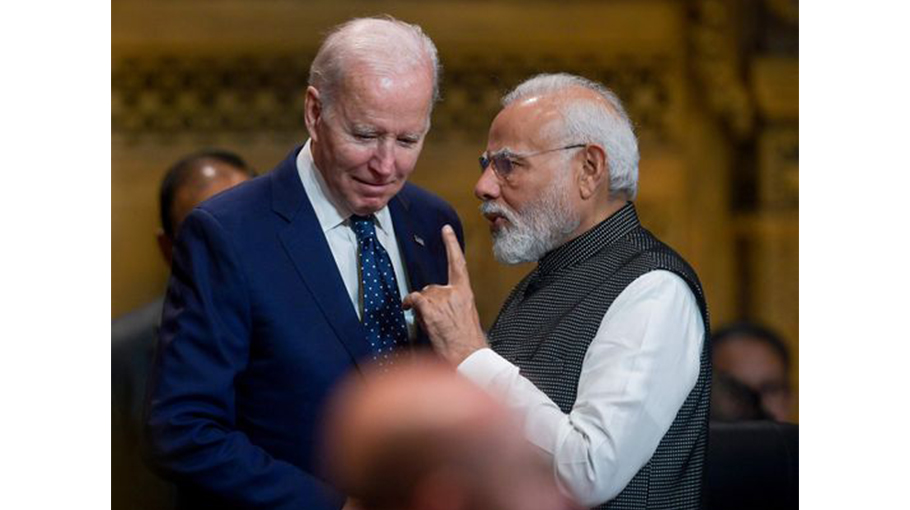Modi at G20: India stakes its claims to a bigger global role
In the climate of global uncertainty and economic gloom, India seems like a bright spot


US President Joe Biden’s walking up, possibly to congratulate, Indian Prime Minister Narendra Modi at Bali, Indonesia, is just one of the many images that are pouring in as India is all set to assume the presidency of the G20 Summit.
Modi’s back is half-turned as Biden approaches him, but he spins around quickly to shake hands and give the US President half a hug, then makes the latter laugh with a thirty second special aside as the they take their seats next to each other after Biden meets other leaders, including French President Emmanuel Macron.
All the while, Indian External Affairs Minister, S. Jaishankar, and National Security Advisor, Ajit Doval, are looking on.
Some have made much of the optics to suggest that India will toe an independent line vis-à-vis the Russian war on Ukraine.
That may be reading too much into the situation but there is no doubt that India will try to assume a bigger role for itself on the world stage as it heads this important conference of nations.
Modi gave a hint of this by emphasizing its traditional role as a peace maker: "Over the past century, the Second World War wreaked havoc in the world. After that, the leaders of that time made a serious effort to take the path of peace. Now it's our turn."
The Group of Twenty or G20 generates 85% of the world’s GDP and 75% of its trade. India, which is to host next year’s summit, will take over its leadership at the end of this year’s meeting.
Modi was indicating that diplomacy, not war, was the way forward in the Ukraine conflict.
As the winter approaches and the war drags on, India offered a message of peace: "I am confident that next year when the G20 meets in the holy land of Buddha and Gandhi, we will all agree to convey a strong message of peace to the world,” said Modi.
He was continuing the theme note struck earlier in the day by Indonesia President Joko Widodo's in his opening address. President Joko, referring to Ukraine, said, "Being responsible means we must end the war. If the war is not ended, it will be difficult to move forward.” He added, "The world must not slip into another Cold War.”
Modi, who arrived on Monday, November 14, the day before the summit, also met a section of the Indian diaspora. In their rousing welcome, he was greeted in chaste Hindi by his hosts, who said that the Indian community is highly regarded in Indonesia.
Employment providers
Why is that the case? Because Indians are seen not as employment seekers, but as an employment providers. Modi, in his return address, said “The accomplishments of Indian diaspora make us proud.” India got its independence two years after Indonesia; even their independence days are just two days apart, with Indonesia’s falling on August 17th compared to India’s August 15th.
“There is a lot that India can learn from Indonesia,” Modi said, as also give Indonesia--“India's talent, technology, innovation, industry have made an identity for themselves in the world. Several big companies of the world have an Indian-origin CEOs."
Modi emphasised India’s age-long cultural ties with Indonesia: “Each year, lakhs of Indians celebrate “Bali Yatra Mahotsav” in Cuttack, Orissa, which is 1500 km away from Indonesia, he said. That is because people have not forgotten their centuries old trade and cultural
relations.
“When people of Indonesia see photos of this year's Bali Jatra on internet, they'll be proud and happy. Due to the issues arising due to COVID, some hurdles had cropped up. After several years, Bali Jatra Mahotsav is being celebrated on a grand scale with mass participation in Odisha."
India’s imports from Indonesia increased to $73 billion from 654.28 billion last year and its exports too have increased from $58.36 to $65.28 billion. Highlighting “Samudra maitri,” or oceanic friendship between the two states, Modi said, “we are not 90 nautical miles apart, but 90 nautical miles close.”
Modi, who also met other world leaders including Rishi Sunak, the newly elevated Prime Minister of United Kingdom and French President Emmanuel Macron, sent a powerful message from the supportive, even adulatory, platform of the Indian diaspora in Bali: “Today's India doesn't think small. Today India is doing work at unprecedented scale and speed. India is a ray of hope for the world in the 21st century.”
Looking at the climate of global uncertainty and economic gloom, India, with a strong and stable leadership, does seem like a bright spot. Perhaps, the 21st century may be India’s after all.
Makarand R. Paranjape is a Professor of English at the Jawaharlal Nehru University.
Views are personal.
Source: Gulf News



